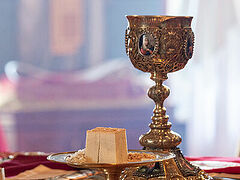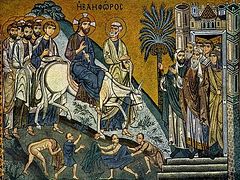How should Christians behave after Communion? Do we need to stay and help clean the church, or should we go home? As a rule, most of us take Communion on Sundays. And then we have household chores, visits to cafes, friends and so on. Is such behavior permissible, and can we not lose the grace received in the sacrament of Communion?
Priest Alexei Veretelnikov, cleric of the Church of the New Martyrs and Confessors of Russia in Strogino, Moscow:
Indeed, we have to admit that in the spiritual practice of a Christian we can find a lot about the rules for preparing for Holy Communion, but very little about how we should behave after this sacrament.
But we should note that some Holy Fathers give quite interesting advice regarding activity after Communion. Thus, St. Theophan the Recluse advises us to avoid daytime sleep so as not to fall into any unclean temptations from the evil spirits. It is known that St. John of Shanghai would spend a long time after services and Communion in church, in the altar, enjoying the feeling of unity with Christ after receiving His Body and Blood. As a young priest St. John of Kronstadt wrote about abstaining from sleeping and eating meat on the day of Communion, and in the final years of his life—about complete abstinence from food. But this is not to say that these rules should be generally followed. Moreover, in the pace of big city life for many, Sunday remains the only day when there is an opportunity to meet with their friends and enjoy a good company. Of course, there is no sin in a good company over a cup of tea.
But at the same time, if possible, on the day of Communion we should refrain from empty and idle pastimes and be alone with ourselves and God at least for a while. It is necessary to try and preserve inner stillness and peace as much as possible and keep a short prayer in mind, so the that mind and heart can avoid empty or, worse, sinful thoughts. We should not be distracted by worldly fuss and idle talks. Sunday requires us to do good deeds, especially on the day we take Communion. It is advisable to devote time to reading the Scriptures, prayer and works of mercy.
Being the heart of the spiritual life, the Eucharist requires that we should be vigilant and attentive to our actions, words and thoughts.
Archpriest Dimitry Vylekzhanin, rector of the Church of the Nativity of John the Baptist, Orshanka village (Yoshkar-Ola and Mari diocese):
Firstly, grace will not be lost after Communion if you treat people around you with love. Whether you are in a cafe, in a store or on the street: If you treat others with love and talk a lot, grace will not go away, but will even increase in your heart. As the Holy Fathers say, you can remain silent but be distracted in the mind, and you can speak and be in the Spirit. Thus, the most important thing is not to sin and to remain in love. It is possible after Communion to be silent, to shut oneself up in a cell, but at the same time to sin more with thoughts than on the street or in communication with people. I think that the most important thing is to treat people with kind feelings and love.
Secondly, grace will not leave you if your mind is in Heaven. Even if physically you communicate with someone on earth, the point is not to bind your soul to earthly interests. Because if you cling to earthly things with all your heart, then, of course, grace will leave you. You must always keep prayer in your soul, and you can do anything except sin with your body and mind.
Priest George Firsov, cleric of the Church of the Dormition of the Mother of God in Veshnyaki, Moscow:
Everyone has a different day: someone, for example, has to go to work after Communion. And if a person can control himself, without talking too much or engaging in silly activities, then I think he can go to work or meet with friends after the Liturgy. Of course, I would not go to a club or to places that are too noisy and directly associated with sin after Communion. And in the everyday context, why not meet with friends or spend some time in a cafe if you are in a peaceful and good mood? If you have some “animal” inside you, you will always feel bad—both after Communion and before.
Sometimes priests advise people to stay in church after Communion and help wipe the icons and clean the candlestands, but I will allow myself to joke on this topic. I think that the fathers who say this are rectors. I personally encourage everyone to go to your mother whom you have not seen for two weeks, to your grandmother, or visit someone else. You can also stay in church—this is also our family, and you should be involved in parish life. People get to know each other when they start washing floors and windows, or sorting out candles. This is helpful, too. So the rectors are certainly right. But if you have your husband with children at home, your soup is not cooked, floors are not washed or other household chores await you and you stay in church for half a day, I believe that is not good. If we work six days a week and on the only day off we stay in church until evening, it seems that it is a crime and will be absolutely bad for family relationships.
Priest Leonid Kudryachov, rector of the Church of the Annunciation of the Most Holy Theotokos in Orenburg:
I presume every priest knows parishioners’ complaints about how hard it is to spend the day they take Communion on their own and in silence. They want to, but they can't! Now a neighbor calls on with her talks, then relatives come unexpectedly, then grandchildren, then they have to go somewhere and do things. Because of this grace spills over, and the bustle of life quickly crowds out the highly spiritual state acquired in church. They endured it once, twice, but how much can they endure?! They get annoyed with their neighbors and circumstances, and anger and tension appear—that is, not at all the fruits that the Apostle Paul speaks of: Love, joy, peace, longsuffering, gentleness, goodness... (Gal. 5:22).
What should we do? How can we safely keep away from the world and everything that is in the world on the day of Communion? Which cave can we hide in? Is there another way to live the day of Communion righteously and properly? I think yes.
Let’s muse on the alternative.
The Holy Gifts are the Lord Jesus Christ Himself. He is our grace! Through Communion we are in Him, and He is in us. Now let us ask ourselves why the Savior wants to be united with us.
There is no simple answer to this question—it is no coincidence that Communion is called a Mystery. For me this event is so multifaceted that I can only contemplate it one facet at a time. This time I reflect on the fact that the Lord established the practice of Communion in order to go away and not go away, to ascend and at the same time remain with us all the days till the end of time. He continues to live on earth through His Body—the Church; He maintains a mystical connection with the members of the Body through Communion.
Thus, the Lord Jesus Christ lived on earth 2000 years ago and lives now in Christians. We know from the Gospels that He spent thirty years in everyday holiness, doing ordinary everyday things very virtuously. Then for three years He served people, preaching the truth and healing the sick. Finally, the time came to take the Cross and go to Golgotha. And all these variations of Christ’s life can and will be manifested in the communicants: everyday holiness, service to others and trials. And that means, having communed, there is no need for us to lock Christ in the apartment; there is no need to put His lamp under a bushel (cf. Mt. 5:15); there is no need to hide Him from other people. The Kingdom of God has drawn near and must not retreat.
Every time we take Communion, we, members of the Body of Christ, receive an impulse to move and act. But it’s scary to act. What if it is hard? What if we sin? What if something does not work out?
But let’s look at the apostles. They received Communion at the Last Supper, and then they had to go through a series of trials. They failed everything! They failed to support Christ during His prayer in the Garden of Gethsemane—they fell asleep. They ran away when He was taken into custody. Peter renounced Christ. Everything went wrong. If they had thought the way modern Orthodox parishioners do, they would have decided that it would be better not to take Communion altogether because of such consequences. Or at least they would have concluded that taking Communion should be less frequent “away from temptation.” But instead they began to partake of the Holy Resurrection every day and more often.
True, we may commit mistakes, blunders and falls, but one learns from one’s mistakes. We learn to make our lives agree with the will of Christ: not to resist Him, but to surrender to Him, trust Him and put Love at the center of life.
Hieromonk Dimitry (Pershin), cleric of the Ascension Cathedral in Alma-Ata:
Communion is participation in the Last Supper. This is communion with Christ, to Whom we became related in the sacraments of Baptism and Chrismation. That is why the priest’s prayers at the altar table are addressed to Him, albeit on behalf of all the faithful who have come to church.
And after taking Communion we show the image of Christ’s love in this world. We fulfill the mission that God the Father entrusted to His Son to share with us. Thus, having united with Him at the Last Supper, we bear witness to the One Whom we have received in Communion, by Whom we live and Whom we serve.
We try not to spill the grace-filled joy that has touched our hearts, but to increase it in works of love, caring for the hungry, the thirsty, the sick, or prisoners.
For the distance between us and God is the distance between us and those who need us. This is the great happiness of Christians—there is no need to go on a pilgrimage to get closer to God.
It is enough to take a few steps to a tired wife, a crying child, a confused old woman; to wash dishes out of turn, sweep the floor, do homework, stay off the internet, play volleyball or football with teenagers, and talk to them about the meaning of life. Finally, get to the nearest nursing home or hospice and get involved in their work.
This is not to mention reading the Word of God, for it refreshes the soul like springs in the heat.
And all this—care for those near and far, faithfulness to our word and the carrying out of our duties—can be dissolved in prayer or at least be a standing in thought before God, Who has sent into our lives the people and circumstances thanks to which we can grow to His measure. And His measure is that of the love of the Cross.









